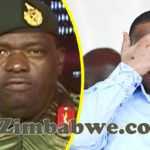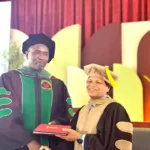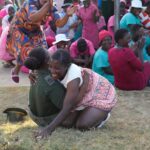President Emmerson Mnangagwa, the leader of Zimbabwe’s ruling party Zanu PF, has made a surprising announcement, revealing his intention to retire and pave the way for a new leader within the party. This revelation came during his visit to the Manicaland region, where he was inaugurating a water and baobab juice making firm.
Speaking at the official launch of a water and baobab juice-making firm in Manicaland, Mnangagwa, who has been at the helm of the nation since his controversial rise to power in 2017, declared his intention to step down after serving his second five-year term.
“Our constitution clearly stipulates that every 5 years we go to congress,” he stated, his words carrying a weight that resonated far beyond the confines of the launch event. “I did my five-year term and we went to a congress and you elected me again. Now I’m doing my last five years and its towards the end of the term. I will go and rest. We will go to congress to look for someone else who will lead the party the way I’m doing. Do you hear that? My retirement days are near. I want to rest. We will go to congress to look elect a person who will fit in my spirit of munhumutapa. You hear that? I’m giving you a hint.”
This unexpected announcement marks a significant departure from previous pronouncements, particularly given the initial reports suggesting Mnangagwa’s intention to remain in office beyond his constitutionally mandated two terms. His current term is set to conclude before the 2028 presidential election.
The news of Mnangagwa’s potential departure has ignited speculation and a flurry of activity within Zanu-PF, as ambitious figures within the party vie for the coveted position of successor. The party’s upcoming congress, which is expected to be held in the coming months, is now poised to become a battleground for power, with potential contenders aligning themselves and strategising for a chance to lead the nation.
However, the political landscape is far from settled. The announcement comes amidst a backdrop of growing discontent and accusations of a deepening authoritarianism within Zimbabwe. The recent pronouncements by Zimbabwe National Army commander Lieutenant General Anselem Nhamo Sanyatwe have further fuelled concerns about the erosion of democratic principles and the military’s increasing influence in the political arena.
Sanyatwe, in a controversial statement, asserted that the military would force citizens to vote for Zanu-PF, ensuring its continued grip on power “until donkeys grow horns.” This blatant disregard for the Constitution, which clearly stipulates the separation of the military and political spheres, has drawn widespread condemnation.
“It’s clear that he violated the constitution and this shows that there is no rule of law in Zimbabwe,” stated Effie Della Ncube, an independent political commentator. “Under normal circumstances President Emerson Mnangagwa is supposed to rebuke him but that’s not the case and the issue lies in the hands of the president.”
Sanyatwe’s remarks have also drawn parallels to the events leading up to the 2008 general elections, when the late army commander General Vitalis Zvinavashe, alongside other top security officials, made similar pronouncements, threatening to refuse to salute any leader who had not participated in the 1960s liberation struggle.
This was seen as a direct threat to the opposition Movement for Democratic Change, led by the late Morgan Tsvangirai, who was then poised to challenge the incumbent Robert Mugabe. The subsequent election was marred by violence and irregularities, ultimately leading to a delayed announcement of results and the formation of a unity government in 2009.
The current situation evokes a sense of déjà vu, with many fearing a repeat of the past. The military’s blatant interference in the political process, coupled with the lack of accountability for past human rights violations, raises serious concerns about the future of democracy in Zimbabwe.
“The military matters in zim, it has become a strong political institution armed and battle ready against any threat to their grip on power,” commented Dube Nkosana Mfan’fikile on social media. “The military has demonstrated that its a professional political entity rooted in Zanupf twisted ideology seing their positions (generals) as entitlement to brazen plundering, looting, bribery as a means to looting minerals and forestry and other nefarious activities like poaching and trading in wild life endangered species. It has built companies that further these interests which also win most public tenders some using fronts. The military has shown that it will respect party/government leaders who allows there illicit, corrupt business activities to flourish. If you become a liability the military will act agsinst you in the do called party name. An army in a supposedly democratic country acting in the name of a party to remove a sitting government. The army is a powerful league of the party. It likes you fine, if it doesnt like you as a leader you are out. So ED is comfortable because he disturbs not the wheels of corruption but championing it. The army is Zanupf no doubt about it. Ordinary soldiers and junior officers are innocent soldiers but the higher the rank the more political it becomes.”

Follow @MyZimbabweNews












